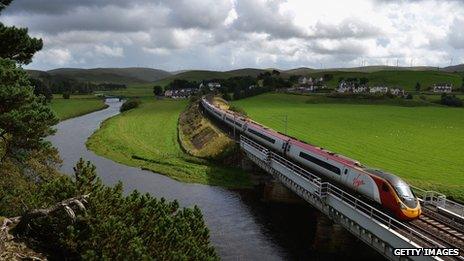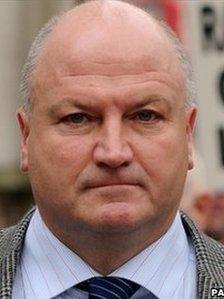West Coast Main Line row: Should railways be renationalised?
- Published
- comments

Should Britain's railways be returned to public ownership?
The collapse of the West Coast Main Line bidding process, after the government found significant flaws, has once again sparked calls in some quarters to renationalise Britain's railways - 17 years after they were privatised.
FirstGroup had been due to take over the running of the line from current operator Virgin Trains in December, but now the competition will have to be re-run after the government scrapped its decision on the franchise.
Here two transport experts argue the case for and against.
AGAINST: Dr Richard Wellings, head of transport, Institute of Economic Affairs
In many ways the railways have been successful over the last 15 years, with significant growth in passenger numbers and freight. Several routes have been upgraded, ageing trains have been replaced and safety has continued to improve.

Dr Richard Wellings says changes are needed but a private rail industry is still the way forward
Taxpayer subsidies have, however, reached unacceptable levels, at around £5bn a year. And costs are much higher than on comparable networks abroad.
In reality, the railways were not privatised properly. Politicians and officials retained tight control. As the current West Coast debacle shows, the government decides who runs the trains. It also decides levels of service, controls prices and determines the priorities for investment.
This is not genuine privatisation. Rail firms are essentially subcontractors for the state. And the high costs of the railways flow directly from these high levels of government involvement.
In particular, the government has imposed a complex artificial structure on the industry. The railways are suffocated by unnecessary bureaucracy. Highly paid lawyers, accountants, consultants and civil servants have benefited at the expense of taxpayers and passengers.
A further shift toward nationalisation would only make this worse. Nationalised industries are hugely inefficient and quickly become a drain on the economy, as we know from bitter experience in the 1960s and 1970s. Politicians would exert even more control over the railways, squandering money to buy off special interests and wasting yet more billions on uneconomic vanity projects.
In the 19th Century private firms built and operated a vast network without massive handouts from taxpayers. A similarly innovative and entrepreneurial private rail industry is the best way to improve outcomes and reduce costs. In particular, the same firms should be free to own the tracks and run the trains, as happened in the past. This is the best way of removing the political interference that is holding the industry back.
FOR: Bob Crow, general secretary, RMT
The sheer scale of the chaos over the botched award of the West Coast Main Line franchise played out in the media must have shocked even those who thought that the insanity of rail privatisation could not plumb any further depths.

Bob Crow says now is the time for renationalisation
Some 3,200 workers on the [West Coast] line, and hundreds more on associated fleet and service contracts, have been left hanging by a thread. Many of them live and work in areas with a rich and proud tradition as a cornerstone of the British railway industry. The reputation of Britain as the nation that gave the railways to the world has been dragged through the mud by this unmitigated and costly shambles.
Leave aside for a moment the corporate Punch and Judy show between First Group and Virgin and the Whitehall farce that even a scriptwriter on Yes Minister would have ditched as too ridiculous. This fiasco shines the spotlight on the greed and self-serving that has robbed billions in profits and dividends from our railways since privatisation two decades ago.
Now, at last, the vast majority of people are waking up to that cold, hard fact. Recent polls show 70% now support the RMT call for full renationalisation. Online polls show that figure at closer to 90%. The entire political class, including the Labour Party, need to be dragged out of their stupor on this central issue.
With fares set to rise by up to 11% in January to boost private profits, thousands of jobs at risk from the McNulty rail review cuts and ticket offices and stations being smashed up by the politicians and their business allies, the time for renationalisation is here right now.
With the East Coast run efficiently and safely in public hands, and contributing hundreds of millions back to the Treasury and investing in services rather than private profits, the West Coast should be next with the rest to follow under one, single, publicly owned and integrated umbrella.
Bring back British Rail? As an alternative to the greed and chaos on our railways laid bare over the past week? You bet.
- Published15 October 2012
- Published3 October 2012
- Published3 October 2012
- Published6 January 2012